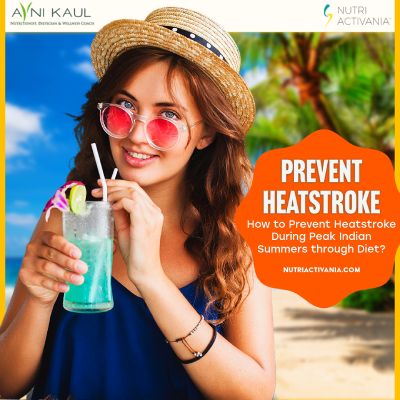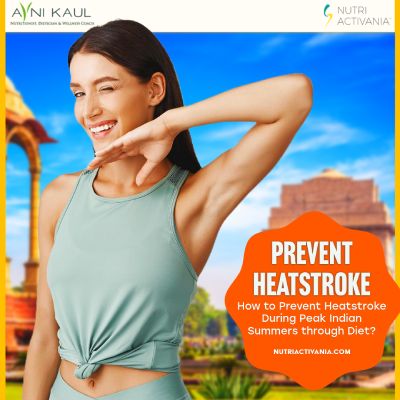As the Indian summer intensifies, the risk of heatstroke becomes a significant health concern. Heatstroke is a severe form of heat-related illness that can occur when the body overheats, typically as a result of prolonged exposure to high temperatures or physical exertion in hot weather. To combat this, a well-planned diet plays a crucial role in helping the body stay cool and hydrated. Here are essential dietary strategies as explained by leading nutritionist and dietician Avni Kaul to prevent heatstroke during the scorching Indian summer, with specific examples of each food type.
How to prevent heatstroke through diet?
Hydration is key, how to maintain hydration? Dietician Avni says, during summer hydration is even more important. To keep yourself hydrated try to follow these processes:
Drink Plenty of Fluids
- Water: Aim for at least 8-10 glasses of water daily. Carry a water bottle and take sips regularly, even if you don’t feel thirsty.
- Electrolyte Solutions: Consuming drinks like ORS (Oral Rehydration Solutions) or natural alternatives like coconut water helps replenish lost electrolytes.
- Herbal Teas: Mint and chamomile teas, served cold, are excellent for cooling the body.
Consume Water-Rich Foods
- Fruits: Watermelon, cucumber, oranges, and grapes are high in water content and help maintain hydration.
- Vegetables: Include lettuce, tomatoes, zucchini, and bell peppers in your diet. These are not only hydrating but also packed with essential nutrients.
Include Cooling Foods
- Yogurt: A great source of probiotics, yogurt helps in digestion and cooling the body. Try it in smoothies or as a standalone snack.
- Mint: Known for it’s cooling properties, add fresh mint leaves to drinks, salads, or yogurt.
- Coconut: Fresh coconut or coconut water provides natural hydration and electrolytes.
Prioritize a Balanced Diet that consist of:
- Proteins: Lean proteins like chicken, fish, tofu, and legumes should be included to maintain energy without causing overheating.
- Carbohydrates: Whole grains such as brown rice, quinoa, and oats are good choices as they provide sustained energy and are easier to digest in hot weather.
- Fats: Include healthy fats from sources like avocados, nuts, and seeds in moderation.
Start Your Day Right – Begin your day with a glass of lukewarm water mixed with lemon juice. This not only helps in detoxifying the body but also aids in maintaining hydration levels.
Avoiding Heat-Inducing Foods and Drinks – As weather outside is quite hot, try to keep your body cool by trying not to opt for caffeine based drinks and spicy and fried foods. You may implement in terms of having:
Limit in caffeine and hard drinks consumption – Both caffeine and alcohol can lead to dehydration. Reduce intake and opt for hydrating alternatives.
Reduced Spicy and Fried Foods – Spicy foods can raise body temperature and cause discomfort in the heat. Fried foods can be heavy and difficult to digest, increasing the body’s internal heat.
Opt for Smaller, Frequent Meals – Eating smaller portions more frequently can prevent the body from overheating during digestion. Avoid heavy, greasy foods that can make you feel sluggish and increase body heat.
Midday Cooling Snacks – Keep cool snacks like fresh fruit salads, smoothies, and popsicles made from natural fruit juices handy for a refreshing and hydrating treat during peak heat hours.
Evening Hydration – End your day with a light, hydrating soup or broth. Soups made from fresh vegetables and herbs can replenish fluids and provide necessary nutrients without being heavy.
Preventing heatstroke requires a holistic approach that combines smart dietary choices with adequate hydration. By incorporating water-rich foods, balanced meals, and cooling ingredients into your diet, you can significantly reduce the risk of heat-related illnesses. Stay hydrated, eat light, and enjoy the vibrant, refreshing flavors that nature offers during the hot summer months. This proactive approach will help you stay cool, energized, and healthy despite the sweltering Indian summer.



